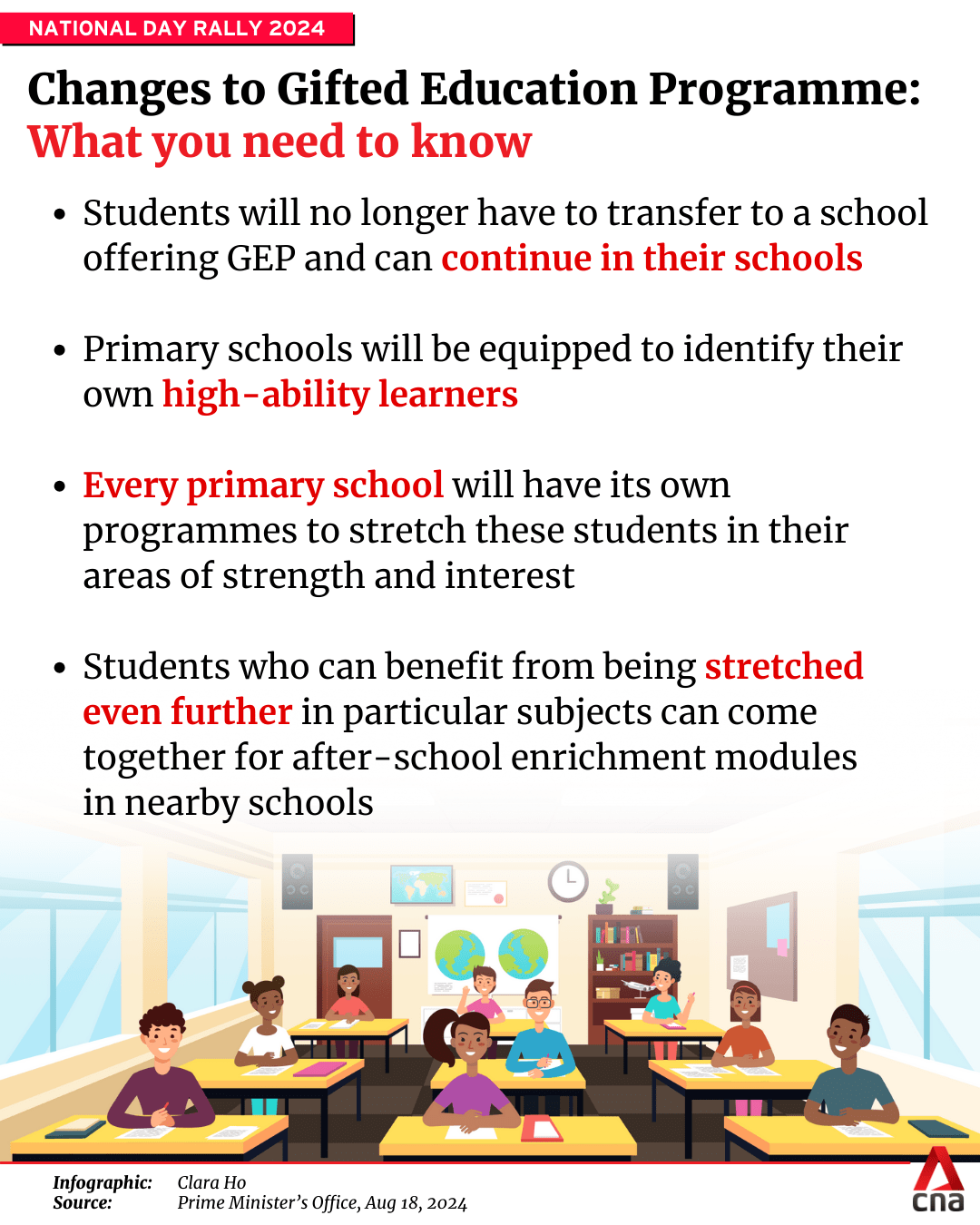Revamped GEP to start with 2024 Primary 1 cohort, 10% of students to be selected for high-ability programmes
Students will take one standardised selection test at Primary 3, but can also be selected to join the new programmes "at multiple junctures" from Primary 4 to 6, says MOE.

File photo of primary school students in a classroom. (Photo: Facebook/Chan Chun Sing)

This audio is generated by an AI tool.
SINGAPORE: School-based programmes for high-ability learners will be expanded to about 10 per cent of the primary school cohort, or about 3,000 students, the Ministry of Education (MOE) said on Monday (Aug 19).This is part of a revamp of the Gifted Education Programme (GEP) announced by Prime Minister Lawrence Wong in his maiden National Day Rally speech on Sunday.
Mr Wong said that the GEP would be discontinued in its current form, and schools would be equipped to identify their own high-ability learners.
Currently, 1 per cent of the cohort is selected for the GEP, studying at one of the nine primary schools that offer the programme from Primary 4. Another 7 per cent of the cohort is part of the school-based programmes for higher-ability learners.
The overhauled programme will be implemented from this year's Primary 1 cohort, MOE said in its press release.
MOE started introducing high-ability programmes in primary schools in 2007 – all schools now have programmes to develop high-ability students with specific strengths and interests in subjects like English, mathematics and science.
MORE CUSTOMISATION FOR STUDENTS
The new model will also provide more customisation for students who may be talented in one or two specific areas, rather than offer a “uniform” GEP curriculum in all areas, MOE said.
For example, a student who is only talented and interested in English but average at mathematics may be accepted into a high-ability programme for English in their school.
This is unlike the current GEP, which focuses on developing students in English, mathematics and science, where students have to do well in all areas of the selection test to join the programme, said MOE.
“What we do observe is that some students can thrive in all three subjects, but there are some students which are stronger in one or two subjects and weaker in others, and they may not necessarily benefit as fully from the kind of GEP model that the students have.”
Students who benefit from even further development can choose to attend after-school modules at designated nearby schools, said the Education Ministry.
These modules will be different from the academic curriculum in schools, designed to “cultivate curiosity and a love for learning”, said MOE in the press release.

Students who participate in these after-school modules will learn alongside students of similar abilities and interests from other schools.
Since these modules also cater to students with specific strengths, more students can take them, compared to the current GEP cohort, the press release read.
“These modules really will not be based on the mainstream curriculum ... It's not about preparing for exams."
To illustrate the difference between the school-based programmes and what the after-school modules may look like, a student who is part of a school-based programme for science will make sense of phenomena and investigate possible solutions through collaborative inquiry.
For example, they may discover Newton's law of cooling as they explore the best way to cool hot tea, inspiring a sense of curiosity and teaching them how to investigate on their own.
Meanwhile, a student who goes for a science after-school module may learn more about the science and technology behind the food on their plate, research sustainable eating practices and propose solutions. This is meant for those who demonstrate a strong interest and an aptitude for seeking answers beyond what is taught in the syllabus.
IDENTIFYING STUDENTS FOR THE PROGRAMMES
Currently, students are selected for the GEP through a two-stage exercise in Primary 3, and those selected are invited to join one of nine GEP primary schools from Primary 4.
The last time this will be conducted is for students who will be Primary 3 in 2025, and the last intake of Primary 4 students will be in 2026, said the Education Ministry.
Under the new system, the first stage of the standardised GEP selection test, which examines their English and mathematics capabilities, at Primary 3 will be retained. The second stage, which involves English and mathematics tests as well as a general ability paper, will be scrapped.
This will not be the only time students can be identified to join the school-based programmes. They can be selected for school-based programmes and after-school modules at multiple junctures between Primary 4 and Primary 6, said the Education Ministry.
Schools can also identify students suitable for the programmes based on day-to-day observations, teacher recommendations and their work, MOE said, adding that there is “no set weighting” for these screening methods.
“This new approach will provide more comprehensive and holistic information about students’ abilities and potential over time.”
Some students may be early bloomers, while others may bloom later, said MOE in a briefing on Monday.
“We don’t want to be just focusing on the P3 selection test for GEP as a single time window to actually identify students with certain intellectual boosts,” added the Education Ministry.
Education Minister Chan Chun Sing said that talents or strengths are not inherent or static. Instead, they are multi-dimensional and manifest over a period of time.
"Hence, if we want to bring out the best in our children, we must shift away from teaching to the average, and change how we nurture our children’s interests, abilities, and diversity," he said in a Facebook post on Monday.
In addition, with programmes in all schools, high-ability students can remain in their own schools at upper primary and no longer need to transfer into one of the nine GEP schools at Primary 4, said MOE.
Mr Chan said this will allow the students to "grow up with friends they have met, teachers who have nurtured them, and maintain these important relationships".
In recent years, MOE has observed students experiencing more stress at the GEP selection, with more students enrolling in private classes to prepare for the selection exercise, the ministry said.
While these preparatory courses do make a difference in whether students are selected for the GEP, it may not be in their child’s best interests, MOE added.
“They may be able to get in through the selection, but they may not thrive in it. That’s definitely a concern for us as well,” said the Education Ministry.
Parents should know the downsides of hothousing - or teaching a child at a high level at an earlier age than usual - their children, said Education Minister Chan Chun Sing on Monday.
"If we now understand that actually there are multiple points of entry and exit, there's no need for us to hothouse our children. And in fact, if anything, it will do the child more harm than good," he said, adding that parents should let their children develop at their natural rate.
DISTRIBUTING TEACHER RESOURCES
The government would not have been able to make these changes in the early years of the GEP because MOE has been building up its capacity over the years, said Mr Chan.
Under the new programme, 10 per cent of the students, or about 3,000 students across 180 primary schools will be able to join school-based programmes for high-ability learners, he noted.
On average, every school will have about 15 students - some may have slightly more while others may have slightly fewer, said Mr Chan.
"But in general, we'll be able to have sufficient resources to distribute across all the different schools in order to conduct these programmes," he added.
Teachers have been trained over the years with strategies and programmes to support high-ability learners, said MOE, adding that teachers will also receive training to provide differentiated instruction during class.
MOE will tap the expertise of the nine GEP primary schools to develop higher-ability learners under the new approach.
“One direct implication is that we will deploy some of these teachers to support the after-school modules, so they may be posted to the schools hosting the after-school modules from 2027 onwards," said the Education Ministry.
There will likely be more schools that offer the after-school modules than the current nine GEP primary schools, said MOE. They will be selected based on considerations such as geographical spread to cater to students across Singapore.
For now, MOE plans for students to attend these after-school modules about once a week, since students may also have commitments to co-curricular activities or other programmes, it said, adding that parents and students are also free to opt out of the programmes.
Some students who are selected to attend after-school modules in more than one subject may go more than once a week, or take different modules in different subjects in different semesters, said the Education Ministry.
















